Goodnature: Rewiring Pest Control — Toxin-Free, Humane, and Data-Smart
Twenty years after a challenge from New Zealand’s Department of Conservation (DOC) sparked an idea, Goodnature has grown into a global standard-bearer for toxin-free, humane, and connected pest control.
From its base in Wellington, the company designs and manufactures what it calls “the world’s smartest traps” — shipping about 100,000 traps and half a million lures annually, with 85% of production exported to the United States, Europe, Australia, Japan, and South America.
“We’ve been toxin-free from day one,” says CEO Dave Shoemack.
“Every trap meets the A-class humane certification standard’. The mission is simple: take a very old, very harmful problem and solve it in a modern, ethical way.”
Origins: A Conservation Problem, an Engineering Answer
Goodnature’s founding brief came straight from the field. DOC asked whether a self-resetting, low-touch trap could help protect vulnerable ecosystems on remote islands and hard-to-service landscapes. The result was the company’s cornerstone product, the A24: a gas-powered, auto-reset trap and six-month gas canister that can humanely dispatch up to 24 rodents before re-servicing.
“It was a game-changer for conservation,” Shoemack notes. “You can set it where there are effectively no people, and it keeps working until you can get back to it.” The same reliability proved valuable to farmers, business owners, lifestyle blocks—and, increasingly, urban consumers who want efficiency without poison or mess.
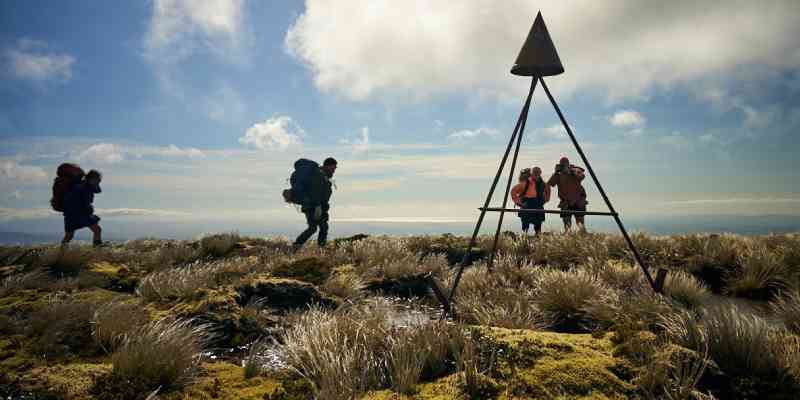
The B Corp Lens: Purpose, Audited
Goodnature was the first pest-control company in the world to achieve B Corp certification — a badge the team treats as a running audit, not a trophy. “It’s hard to earn and harder to keep, especially if you manufacture and ship globally,” Shoemack says. “B Corp gives us a helicopter view of what ‘good business’ looks like and forces evidence across the board.”
That discipline has sharpened practices in supplier engagement (“pushing partners to lift their game”), premises (a recent move to a more efficient head office and production site), wellbeing (formal wellbeing days and supports), governance (diversity at board level), and community impact (time, training, and product donations).
Among its give-back programs is Cahoot: for every trap a community group purchases, Goodnature donates one — and pairs the hardware with field expertise to maximize results. “It’s about doubling impact and making sure the gear is used well,” Shoemack says.
Culture by Design: Trailblazers, Dead Simple, Straight Up
With a core team of ~40 in Wellington, Goodnature runs on three values:
- Trailblazers — push the boundaries in every function, not just R&D.
- Dead Simple — make complex tech feel effortless for users, and remove friction internally.
- Straight Up — be candid, accountable, and respectful; improvement requires honest feedback.
One deliberate quirk: the company rarely hires from traditional pest control. “We’re breaking the rules of the industry,” Shoemack says. “We want fresh perspectives. Learn the rules — then reimagine them.” That approach has fueled internal mobility too: team members from production have stepped into commercial and product roles, carrying deep product understanding with them.
Product Strategy: Humane by Default, Consumer-Friendly by Design
While the A24 remains the industrial workhorse, Goodnature’s newest launch is a connected mousetrap designed expressly for consumers — think the style-conscious, time-poor apartment dweller who doesn’t want to see, touch, or manually reset anything.
“It’s built around user experience,” Shoemack says. The trap notifies the owner via the app when a strike occurs; disposal is clean; the unit resets itself; and the overall architecture excludes non-targets while making entry easy for the intended species. “You can put one in an attic or basement and forget it,” he adds. “You’ll hear from the trap when you need to.”
Almost every trap Goodnature sells is now connected. That creates value not only for owners (alerts, placement guidance, troubleshooting) but also in aggregate: “We probably know more about rodent behavior than anyone,” Shoemack says. “Kill counts, time-of-day patterns, temperature — at scale, the signals are powerful.”
Ethical Wildlife Management: From Principle to Regulation
What began as a principled stance — no toxins, humane by design — is steadily becoming a regulatory baseline in multiple markets. “In Sweden, parts of the U.S., Norway, and the Netherlands, restrictions on toxins are tightening,” Shoemack notes.
“It could be hard to buy toxins anywhere.” The goal is clear: be there with the best solution as the market shifts, and make advanced control accessible beyond today’s premium segment.
Partnerships that Compound Impact
Forming and nurturing partnerships is a cornerstone of Goodnature’s business focus. Shoemack highlights a few including:
- DOC (Department of Conservation) — Seed-funded the original A24 concept and remains a large-scale project partner, providing critical feedback loops across hundreds to thousands of traps in the field.
- Capital Kiwi (Wellington) — An ambitious urban-edge program that deployed ~1,100 Goodnature traps to remove stoats and rats, paving the way for the return of kiwi near the city. “When trapping is done well, you hear it — kiwi calls are back,” Shoemack says.
- NTD (Napier Tool & Die) — A 14–15 year plastics partner deeply embedded in product improvement and supply reliability.
- Gallagher — The NZ ag-tech leader (famed for electric fencing) is Goodnature’s largest investor and a global distribution partner. “We’ve learned from their scale and structure; they’ve learned from our speed and entrepreneurial muscle,” Shoemack says.
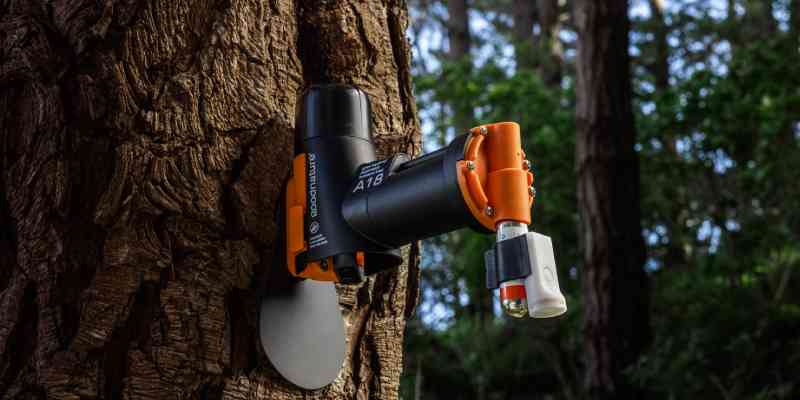
Measuring Impact: Carbon and Biodiversity
Goodnature currently tracks operational carbon and is preparing to expand to full product lifecycle metrics — materials, suppliers, logistics — in step with evolving B Corp requirements and EU expectations. “We’ve known it’s coming,” Shoemack says. “The next audit will go deeper, end-to-end.”
At the same time, the company is explicit about the biodiversity side of the ledger. Its north star is not units shipped but pests removed humanely and habitats protected. “Our vision is 100 million smart kills by 2030,” Shoemack says. “On our current run rate we’d hit 30–40 million — so we need to lift our game. If we do, the biodiversity impact is massive.”
Manufacturing at Home, Competing Everywhere
Goodnature builds every trap in Wellington—a choice that tightens QA and speeds iteration. It also demands sharp logistics and continuous improvement. B Corp’s frameworks have informed how the company sets up lines, powers facilities, and selects energy. “We’re a physical manufacturer in a world where many impact firms are purely digital,” Shoemack says.
“We like the accountability that comes with that.”
The Next Five Years: Scale, Access, Intelligence
Goodnature’s growth plan hinges on three levers:
- Scale the platform
- Expand consumer and professional adoption in key markets.
- Maintain Class-A humane and toxin-free standards as table stakes.
- Broaden access
- Keep the super-premium tier but explore configurations that make smart, humane control accessible to a wider audience — without compromising ethics or performance.
- Elevate customer experience
- Deliver seamless, smart pest control through intuitive setup, real-time insights, and proactive guidance. Ensuring every customer feels in control and confident. Increasing our impact significantly by 2030.
“The wave is coming,” Shoemack says of global toxin restrictions and consumer expectations.
“Our job is to be ready with the best solution when people decide to surf it.”
AT A GLANCE:
Who: Goodnature
What: A top pest control company utilizing sustainable and natural products
Where: Wellington, New Zealand
Website: goodnature.com.au
PREFERRED VENDORS/PARTNERS
Prestige Print : prestigeprint.co.nz
Prestige Print and Goodnature share environmental values, prioritizing sustainability. For our offset printing, we use mineral-free, vegetable oil-based inks, FSC-certified paper from sustainable forests, and operate fully electric vehicles for their account manager and delivery van, demonstrating a commitment to eco-friendly practices in running Prestige print’s business operations.

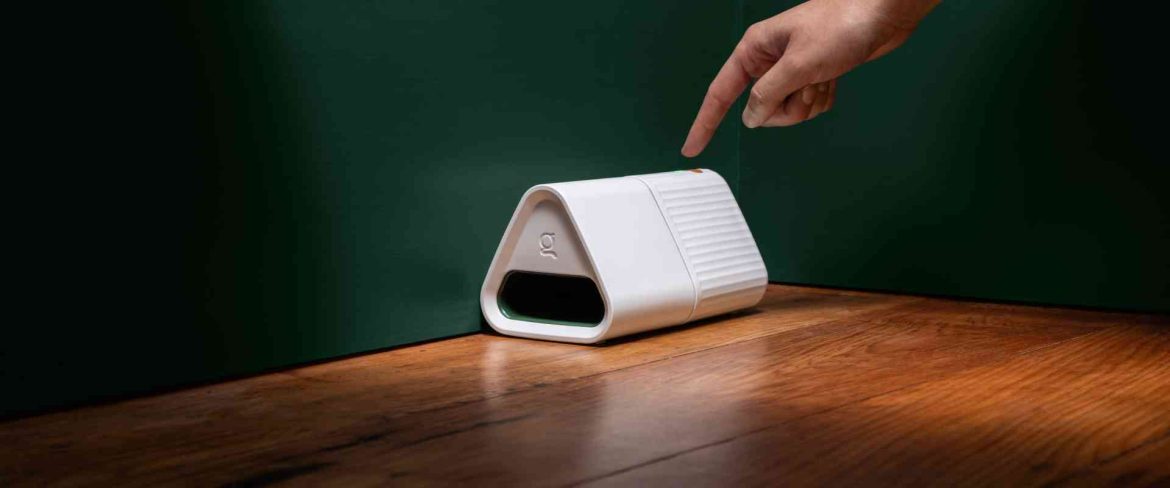
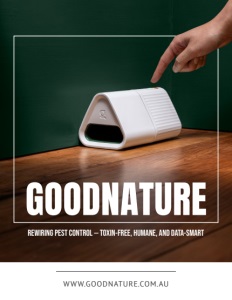
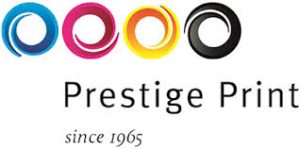
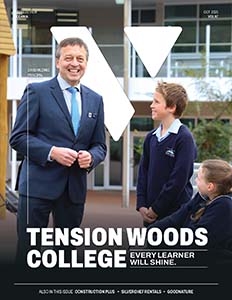
 This information will never be shared to third parties
This information will never be shared to third parties